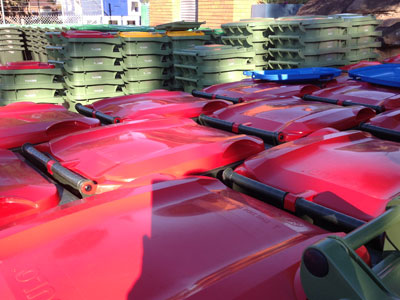Sydney Water and Randwick City Council look to recycle food scraps into electricity
- Published Date
- 13/06/2014
- News Topic
- Sustainability & Environment

Sydney Water and Randwick City Council are partnering on an innovative project that could see kitchen food scraps processed at a sewage treatment plant to produce electricity and to reduce waste going to landfill.
A feasibility study has commenced to determine the possibility of taking household food scraps to the Malabar Wastewater Treatment Plant. This follows Randwick Council's trial of food scraps collection in 5,000 apartments and townhouses across Randwick City. Council is now looking to expand the trial to all apartments and townhouses in Randwick City within the next three years.
Randwick Mayor Scott Nash said, "Household food scraps are an important resource in both nutrients and energy and sending scraps to landfill is a waste.
"At the moment nearly 40 per cent of our 27,000 tonnes of general waste collected - that's rubbish from residential red-lidded rubbish bins - is made up of food scraps and this mostly ends up in landfill. It makes sense to look at ways of recovering as much of this material as possible rather than dumping it.
"Landfill tipping costs are continuing to rise, so if we can reduce landfill and instead produce biogas to generate electricity it potentially means that Council and ratepayers could be saving money.
"This study will look at the implications of taking food scraps to Malabar - costs, truck movements, benefits and processing options.
"While it's still early days, I'm proud that our Council is leading the way with Sydney Water to look at alternative treatment options to recycle our waste. This is the sort of forward-thinking approach required to meet the State Government's 75 per cent landfill diversion target.
"Once we get the results they'll be made available to the general public and we'll need to consult closely with local residents on their views before deciding whether to commence a trial", said the Mayor.
Paul Freeman, Acting Managing Director of Sydney Water said, "This study will help us work out if it's feasible to process food waste with sludge at Malabar Wastewater Treatment Plant. Not only will we be helping the environment by reducing waste but this process, called co-digestion, will also produce methane which we will then use to generate electricity at our Malabar plant. This could reduce the amount of electricity that the plant needs to purchase from the grid.
"This process would be an Australian first and a wonderful example of Sydney Water and Randwick Council working together on innovative solutions to enhance the quality of life for residents in Randwick City. It follows the good work we've done together at Malabar to reduce stormwater run-off to the beach at Long Bay.
"Sydney Water is an international leader in developing proactive approaches with our community partners such as Randwick Council. By creating solutions which reduce environmental impact, manage waste and reduce cost we may reduce cost of living pressures while enhancing our city's liveability.
"We will consult the local community, should we decide to progress to the next stage of planning, so that feedback from local residents can be incorporated into our planning and the measures we take to reduce impacts", said Mr Freeman.
This project is part of a Sydney-wide program of innovative renewable energy projects being conducted by Sydney Water. Current projects are producing enough energy to power over 9,000 homes each year while at the same time reducing waste production and greenhouse gas emissions by over 60 thousand tonnes a year.
